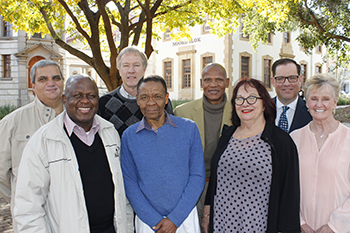Latest News Archive
Please select Category, Year, and then Month to display items
12 January 2024
|
Story Nonsindiswe Qwabe
|
Photo Sonia Small
 Since joining the UFS in 2008, Dr Grey Magaiza has worked extensively on approaches that can foster the socio-economic transformation of societies.
Since joining the UFS in 2008, Dr Grey Magaiza has worked extensively on approaches that can foster the socio-economic transformation of societies.
“The future should be one where communities can decide on their development agenda and futures. That’s the most important for me.” Dr Grey Magaiza, Deputy Director of the Centre for Gender and Africa Studies (CGAS) and Head of the Community Development programme on the Qwaqwa Campus, is passionate about capacitating communities to be agents of change and advancement. His vision for the future emphasises the empowerment of communities to take charge of their development by actively participating in decision making and the implementation of development projects that can improve their lives.
Since joining the UFS in 2008, Dr Magaiza has worked extensively on approaches that can foster the socio-economic transformation of societies. Over the years, he has crafted his research speciality into one that he is most proud of – being an interdisciplinary scientist immersed in the development of communities.
“I’m in a fortunate position of researching what I like. I say ‘fortunate’, because I’ve taken the time to understand what I’m passionate about, which is the overall field of rural livelihoods and livelihood futures – in short, community development. My research starts from an engaged university, understanding the elements that a university must use to enhance transformation and relevance to its immediate community in terms of development.”
One of the ways he has done this is by looking at social entrepreneurship as a development approach for young people in a rural setting. Through workshops with non-profit and civic organisations in Qwaqwa, Dr Magaiza has been helping these organisations to map out their needs and actively meet them through the involvement and support of external role players.
“We understand that communities are part of the national development agenda, but even that national agenda respects community knowledge and intentions and allows communities to shape their identity. A critical enabler of this is community organising. You bring back the capacity in communities to have dialogues on issues affecting them as spaces for engagement, knowledge exchange, and for people to just talk about their way forward.”
By enabling communities to define their development agenda, they can address their specific needs, challenges, and aspirations, he said. “When I look at livelihood futures, it’s quite an exciting aspect of my work – it’s like looking into a fortune tellers’ globe, because you’re not deciding for communities what they should do, but the communities themselves take those decisions.”
South Campus first in SA to introduce new online platform for educators
2016-05-25

Dr Whitty Green (DHET), Phillip Dikgomo (NDBE), Ernst Stals (Free State Department of Education), Isaac Mogotsi (Nothern Cape Department of Education), Tsatsi Montso (Free State Department of Education), Prof Daniella Coetzee (Principal: South Campus), Steven Bailey (Academic Partnerships), and Prof Judy Zimny (Academic Partnerships)
Photo: Eugene Seegers |
The South Campus of the University of the Free State (UFS) has become the first in South Africa to introduce a completely online platform for educators to obtain the Advanced Certificate in Teaching (ACT) in either Foundation, Intermediate, or Senior Phase.
Beginning with the first start date of 4 July 2016, this platform will be offered in nine or ten 8-week sessions. It will provide educators the opportunity to complete these certificates in 18-20 months compared to the 24 months usually required by part-time university students. Academic and technological support will also be provided.
Unique platform
Prof Daniella Coetzee, Principal of South Campus, said that she is thrilled, “as this opportunity for educators to earn a qualification 100% online - is a first for both the UFS and South Africa.” This opportunity represents tremendous strides in providing options for South African educators.
According to Prof Jonathan Jansen, Vice-Chancellor and Rector of the UFS, human connectivity is a key component of education: “We should never reduce education to a stranger at a distance without any human interaction. That is also why the UFS has been consistent in promoting not only its Academic Project, but the Human Project as well.” He said that it would not be possible to extend second-chance opportunities to students without partnerships with government, non-profit organisations, local and international academic partners, and other external stakeholders.
Specific challenges addressed
In her presentation, Prof Judy Zimny, who is affiliated with Academic Partnerships (a company that has supported more than 40 universities in providing high-quality online programmes for educators) aligned a number of the challenges described by South African leaders in supporting educators with opportunities now available through online education as a result of recent strides in learning technologies.
Various members of the national education sector were also present at the workshop to give their input: Isaac Mogotsi (Northern Cape Department of Education), Phillip Dikgomo (National Department of Basic Education - NDBE), Dr Whitty Green (Department of Higher Education and Training - DHET), Tsatsi Montso (Free State Department of Education), and Ernst Stals (Free State Department of Education).
For educators interested in pursuing an Advanced Teaching Certificate (ACT), the website will soon be populated with all admission and enrolment information for programmes starting on 4 July 2016, 29 August 2016, and 24 October 2016.